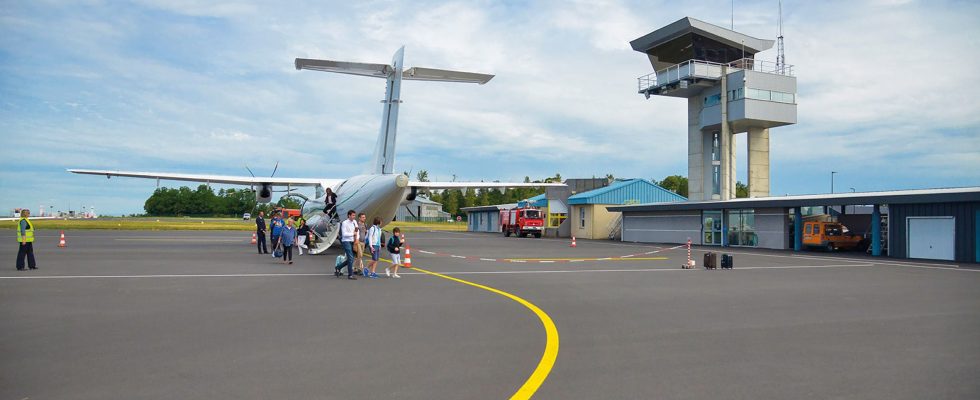In Aurillac, the airport looks like a sub-prefecture station. In the middle of fields and mountains, the 48-seat ATR drops off executives and business leaders who are rushing to join their first meeting. The landscape alone sums up the isolation of the capital of Cantal, considered by the public authorities as the most isolated department in France. The relief has discouraged successive governments from creating a TGV line for several decades. The TER to reach the capital takes 5h04 – in the best case. And it takes at least an hour to reach the A75 motorway, around a hundred kilometers away.
The plane therefore lands every morning at 10:25 a.m. and leaves at 6:05 p.m. Another arrives at 9:25 p.m. for the next day’s meetings. Two rotations follow each day. Adrien Nivoliez, head of Biose Industrie, a microbiology company which carries out 90% of its activity internationally (42 million euros turnover, 350 employees), is one of its regular users. His company uses the connection “1 day out of 3”: “If there was a fast train, there would be no problem, we would take it. But that is not the case. However, today, to be competitive with our American competitors, we must be close to the decision-making centers.” Between quality control visits to its laboratories and those of its customers, it must be “one hour from Paris”. Without the line? He would consider relocating a company established here since 1951.
Private actors and public authorities alike insist on the usefulness of this aircraft. “Opening up tool”; “attractiveness of Cantal”; “talent attraction”: the arguments are multiple. But at a time when the government is chasing domestic travel, is its continuation justified? The question does not arise for the State which considers it as a “land use planning line”.
“Without this line, we die”
This name designates these daily journeys which do not have a direct rail connection with the capital of less than 2.5 hours. Considered as public services in the same way as a bus service, they are largely financed by the State. Between 2023 and 2027, the government has committed to covering 55% of the operating deficit of the Aurillac-Paris line, or 10.2 million euros. Cities like Agen or Tarbes also benefit from such a system.
The rest of the bill is shared between the department, town hall and chamber of commerce. A situation which does not raise criticism at the local level. “Without this line, we will die,” summarizes the general director of the department’s chamber of commerce, Laurent Ladoux. “For our economy, it is an umbilical cord,” confirms the president of the department (LR), Bruno Faure. The subject was never included in the debates of the last municipal elections. Nor was the vote on the allocation of subsidies called into question by the opposition. Even environmentalists recognize the indispensability of the airport. “There is no debate between us”, evades PS mayor Pierre Mathonier and member of the union group of leftists and ecologists in the Departmental Council.
However, it only has a 50% occupancy rate. And it especially benefits businesses. According to estimates from the mayor of Aurillac, nearly half of trips are for professional reasons. Optimizing the occupancy rate would therefore be beneficial for the environment and would provide an additional argument to supporters of this line. If they need it…
An article from the special report of L’Express “These cities that make France move”, published in the weekly of April 4.
